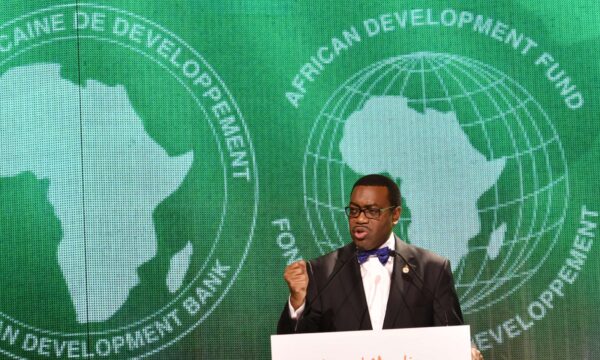Africa’s total debt stock, both external and domestic currently stands at $500 billion.
The African Development Bank (AfDB) revealed this during Thursday’s public presentation of African Economic Outlook 2020 in Abidjan.
The AfDB President, Dr Akinwumi Adesina who made the disclosure said Median Debt to Gross Domestic Product (GDP) had risen from 38 per cent in 2008 to 54 per cent in 2018.
He however said there was no need for panic, rather efforts are required to tackle rising debt levels.
“However, we must watch the quality of debt, the mix of debt in terms of concessional and non-concessional, the potential negative effects of rising domestic debt in crowding out private sector access to finance, the increasing level of non-Paris Club bilateral debt, and rising volumes of Euro bonds.
“While there is no cause for alarm, greater prudence is needed. We all must now collectively focus on sustainable debt management and greater reliance on domestic resource mobilisation to finance rising fiscal deficits.
Adesina added that “The bulk of the debt is actually spent on infrastructure, which remains a major challenge for many countries.
“Governments can improve the cost effectiveness of their expenditures on infrastructure by sharply focusing on quality infrastructure, improved efficiency of public expenditure on infrastructure, while promoting greater participation of private sector in the provision of infrastructure.”
“Physical infrastructure, while important, is not enough to drive much needed greater growth and productivity of African economies. African countries should accelerate investments as well in the development of human capital” he advised.
Stable growth
Meanwhile the bank said Africa’s economic growth remained stable in 2019 at 3.4 percent and is on course to pick up to 3.9 percent in 2020 and 4.1 percent in 2021.
The slower than expected growth is partly due to the moderate expansion of the continent’s “big five” — Algeria, Egypt, Morocco, Nigeria, and South Africa – whose joint growth was an average rate of 3.1 percent, compared with the average of 4.0 percent for the rest of the continent.
The Bank’s flagship publication, published annually since 2003, provides headline numbers on Africa’s economic performance and outlook. The 2020 edition, launched at the Bank’s Abidjan headquarters, was attended by former Liberian president Ellen Johnson Sirleaf, African ministers, diplomats, researchers, and representatives of various international bodies.
Overall, the forecast described the continent’s growth fundamentals as improved, driven by a gradual shift toward investments and net exports, and away from private consumption.
East Africa maintained its lead as the continent’s fastest-growing region, with average growth estimated at 5.0 percent in 2019; North Africa was the second fastest, at 4.1 percent, while West Africa’s growth rose to 3.7 percent in 2019, up from 3.4 percent the year before.
Central Africa grew at 3.2 percent in 2019, up from 2.7 percent in 2018, while Southern Africa’s growth slowed considerably over the same period, from 1.2 percent to 0.7 percent, dragged down by the devastating cyclones Idai and Kenneth.
Source: Africafeeds.com



